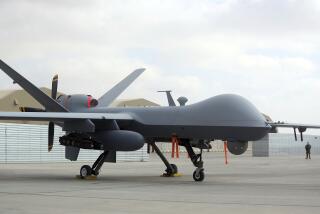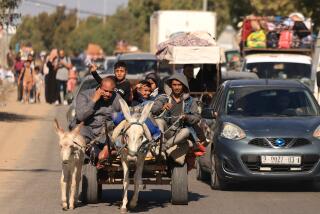U.N. Issues New Warning to Yugoslavia
- Share via
UNITED NATIONS — The U.N. Security Council sent a new warning Thursday to Yugoslav President Slobodan Milosevic over reported atrocities in Kosovo, and White House National Security Advisor Samuel R. “Sandy” Berger indicated that U.S. and other NATO aircraft could strike targets in the breakaway Serbian province in a matter of days.
In Washington, Berger said the U.S. could begin assigning aircraft to participate in airstrikes as soon as today. But he indicated that action, if it comes, would not be likely until the end of next week.
Spurred by the latest reports of massacres and house burnings in civilian areas of Kosovo, the Security Council condemned the bloodletting and called on Milosevic to identify and prosecute those responsible--believed to be Yugoslav government security forces--and to withdraw his troops and police.
With council members Russia and China still counseling against the use of force, the statement refrained from a specific threat of military punishment. But diplomats here, in Washington and in Europe said they hope that a report on the situation, due no later than Monday from Secretary-General Kofi Annan, will build further support for an attack.
Annan and other U.N. officials have been unusually outspoken this week in blaming Serbian troops controlled by the Yugoslav government for the latest outrages.
“I utterly condemn the wanton killings and excesses by Serbian security forces,” Annan said Thursday.
If Annan does not sway opinion on the council more strongly in favor of an attack, diplomatic sources suggested that the North Atlantic Treaty Organization might proceed with airstrikes without additional authorization by the council.
Berger, at a breakfast meeting with reporters, said: “We will designate, as will other NATO forces, particular aircraft wings, particular personnel that will be engaged in this, but that doesn’t mean we would move them at that point. The final step . . . is a decision by NATO itself. . . . Preceding that step, each of the NATO capitals would have to make a political decision [that] it was prepared to act.”
A senior NATO diplomat in Brussels said the alliance is now going back to member governments, checking to make sure the forces that countries had pledged were actually going to be provided. Then these forces have to be trained for Kosovo, where hundreds of people have died in a Serbian crackdown against ethnic Albanian guerrillas that began in February.
This timetable, coupled with Berger’s remarks, indicates that the earliest practical date for action would be the end of next week.
Berger ruled out deployment of any U.S. ground troops for Kosovo, a decision likely to make it easier to get congressional support.
“I don’t think ground forces are necessary for this mission,” he said. “If you’re talking about a ground force to go in and stop the fighting, that’s not something we’d favor now.”
Berger, Secretary of State Madeleine Albright and Defense Secretary William S. Cohen briefed members of the Senate on the situation at a closed meeting late Thursday, and Albright said afterward that “the combined threat of the use of force and diplomacy is the best way of proceeding.”
“We believe the best solution continues to be a diplomatic solution,” she added.
Berger also stressed that the Clinton administration prefers a diplomatic solution.
“We have to . . . make it very clear to Milosevic that we prefer a negotiated solution, that we prefer he move his troops back, that he move the troops he traditionally has had in Kosovo into barracks, that he allow humanitarian workers to do their job, and engage in serious negotiations,” Berger said. “That would be the best solution.”
Thursday’s council action--its second warning to Milosevic in eight days--reiterated earlier demands for an immediate cease-fire, a troop pullback and serious negotiations on the resumption of a semiautonomous government in the Serbian province. Serbia and its smaller ally, Montenegro, make up what remains of Yugoslavia.
The council also noted that the U.N. International Criminal Tribunal for the Former Yugoslavia has the power to investigate the weekend incidents, in which more than 30 civilians reportedly were killed.
“It’s a very clear and direct message to the government in Belgrade that they have to be responsible for the actions of their security forces,” said Peter Burleigh, the chief American delegate to the United Nations.
Serbian government troops were sent into Kosovo to battle ethnic Albanian rebels who seek independence for the province. But U.N. officials and human rights groups say that Serbian security forces are conducting a campaign of terror against civilians, executing entire families and pillaging villages. News reports--including graphic photos and video footage shown around the world--of the latest massacres have increased international pressure for a forceful response.
“We’ve really entered a new phase here,” Berger said. “We’ve got to be prepared to act. There’s a high degree of unity on this in NATO and beyond, into the Security Council.”
On Thursday, the State Department issued a travel warning advising Americans to stay out of Yugoslavia and suggesting that those who are there should leave.
Adding to the pressure on the international community to act is the prospect of a humanitarian disaster facing up to 300,000 refugees with the impending onset of winter. U.N. refugee officials estimate that as many as 50,000 refugees are homeless and say that Serbian troops have blocked delivery of aid to thousands of displaced people.
Yugoslav government officials deny that their forces are responsible for the killings and say that security forces have crushed the rebellion and are returning to their barracks.
U.S. and British officials, who have been the most supportive of a military strike, hope that Annan’s report Monday will build further support for an attack. Although Washington contends that there already is adequate backing in international law for bombing, most states represented on the 15-member Security Council and many other NATO members would prefer a formal authorization.
But that risks opposition by Russia, a traditional Serbian ally. As one of five permanent council members, Russia could unilaterally veto such a measure.
In Moscow, the Russian government sharply criticized the possibility of NATO bombing raids. The use of force “may seriously aggravate the situation in the region and deal a serious blow to the United Nations, the U.N. Security Council and the entire system of international relations,” said Russian Foreign Ministry spokesman Vladimir Rakhmanin.
Turner reported from the United Nations and Marshall from Washington. Times staff writers Richard C. Paddock in Moscow and Norman Kempster in Washington also contributed to this report.
(BEGIN TEXT OF INFOBOX / INFOGRAPHIC)
Crisis in Kosovo
The U.N. Security Council sent a tough new warning to Yugoslav President Slobodan Milosevic. National Security Advisor Samuel R. “Sandy” Berger indicated that NATO airstrikes could come in Kosovo in a matter of days.
Golubovac: Residents witnessed Serbian forces kill at least 13 male refugees Saturday.
Gornje Obrinje: Diplomats, journalists and human rights workers say as many as 18 mutilated bodies that Albanians said were massacred by Serbs on Sunday.
Vranic: Serbian police attacked a convoy of civilian vehicles Tuesday.
Source: Associated Press
More to Read
Sign up for Essential California
The most important California stories and recommendations in your inbox every morning.
You may occasionally receive promotional content from the Los Angeles Times.













